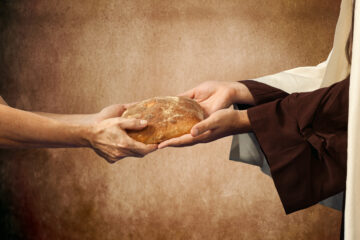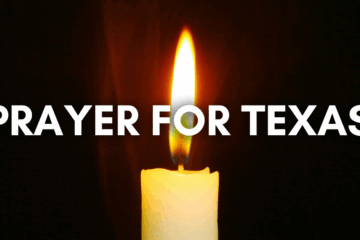Welcome to The Daily Prayer Team messages, each day includes a passage of scripture, a reflection and a prayer. Sponsored by Saint John Greek Orthodox Church in Tampa, FL.
Therefore, let us be grateful for receiving a kingdom that cannot be shaken, and thus let us offer to God acceptable worship, with reverence and awe. Hebrews 12: 28
One of the biggest gaps in our practice of the Orthodox faith has to do with worship. For most people, our experience of worship is limited to the Divine Liturgy. The Orthodox faith actually has a rich anthology of worship services besides the Divine Liturgy. The Divine Liturgy is virtually the same each time it is celebrated. The variable parts are hymns and scripture readings that are unique to a particular day. There are, however, may other services besides the Divine Liturgy.
The day begins with the sunset, so the first service of the day is Vespers. As the sun sets, the Vespers begins the feast of the following day. For instance, the feast of St. John the Baptist is January 7. On the night of January 6, there is a Vespers service that begins the feast of St. John the Baptist. Vespers will include hymns about the life of the saint, as well as readings from the Old Testament that are related to the kind of feast we are celebrating—i.e. if it for a prophet or a martyr or a hierarch or an event in the life of Christ. Vespers is also traditionally celebrated in Saturday evenings, in anticipation of the Divine Liturgy on Sunday, and the content of the Vespers generally is about the Resurrection. While the Vespers service is not celebrated in all parishes consistently, Vespers is always celebrated the evening before the feast of the parish, as well as during Holy Week (Vespers unnailing or Apokathelosis on Good Friday afternoon, and Agape Vespers on Pascha), during Great Lent (Lent begins with the forgiveness Vespers) and on Pentecost (vespers of the Descent of the Holy Spirit, sometimes called the Kneeling Vespers).
The service that begins the calendar day is the Orthros, which comes from “Orthoi” which means “to rise.” Orthros can be celebrate alone or usually it is done in connection with the Divine Liturgy. The hymns of Orthros vary each day, as they commemorate the life of the saint being celebrated, or on Sundays, hymns of the Resurrection. While the Divine Liturgy is again generally the same, the Orthros is different virtually every time it is celebrated. There is a different Orthros (as well as Vespers) for every day of the year.
Paraklesis is a service of supplication to the Virgin Mary. It is traditionally offered during the first fourteen days of August and can be done in any time of sorrow or distress. At the Paraklesis service, we can offer individual names and needs so that the priest can mention them in the petitions of the service. When there is a national crisis, as an example, the service we gather to offer is the Paraklesis. In our parish, we offer one every year on September 11, as we remember the terrorist attack on America in 2001. When a family member is very sick, the Paraklesis Service can be offered.
Holy Unction is a service of prayer and healing for a wounded soul and body. It is not strictly a Lenten service. In our parish, we offer Holy Unction on the first day of the Nativity Fast (November 15), the first day of Great Lent, and on Holy Wednesday.
There is a Lenten cycle of services—Great Compline is held on weekdays and is a service of Psalms, hymns and prayers of repentance. The Pre-Sanctified Liturgy is done on Wednesdays and Fridays of Lent and is a vespers service with Holy Communion added to the end from elements that were pre-sanctified the previous Sunday. The Salutations to the Virgin Mary are a service of devotion to the Virgin Mary, praising her for her great service in bearing the Christ in her womb.
Holy Week has a cycle of Orthros and Vespers services held each day, though they are generally done twelve hours ahead, so that the evening services are actually Orthros services while the morning services are the Vespers services.
Baptisms, weddings and funerals are done frequently in every church, marking these major milestones in the lives of parishioners.
Smaller, more private services include, the forty blessing of a baby, a blessing of a home, graveside services, and the sacrament of confession.
If we only attend the Divine Liturgy, we miss out on the opportunity for other, more diverse experiences of worship. And we get the sense that all worship services are the same, which is not true at all. You are encouraged to attend as many different worship services as possible. Take advantage of the seasons by attending at least one Paraklesis in August, at least one Pre-Sanctified Liturgy during Great Lent, as many Holy Week services as you can get to, etc.
The purpose of worship is to be with the Lord in a corporate context, to pray together with others, to set aside our everyday stresses, and to enter into heaven, experiencing His grace in this unique way. Worship also helps us to learn. Each service helps us worship and experience the Lord in a different way.
Ascribe to the Lord, O heavenly beings, ascribe to the Lord glory and strength. Ascribe to the Lord the glory of His name; worship the Lord in holy array. The voice of the Lord is upon the waters; the God of glory thunders, the Lord, upon many waters. The voice of the Lord is powerful, the voice of the Lord is full of majesty. The voice of the Lord breaks the cedars, the Lord breaks the cedars of Lebanon. He makes Lebanon to skip like a calf, and Sirion like a young wild ox. The voice of the Lord flashes forth flames of fire. The voice of the Lord shakes the wilderness, the Lord shales the wilderness of Kadesh. The voice of the Lord makes the oaks to whirl, and strips the forests bare; and in His temple all cry “Glory!” The Lord sits enthrones over the flood; the Lord sits enthrones as king forever. May the Lord give strength to His people! May the Lord bless His people with peace! Psalm 29
Worship the Lord in diverse ways by attending not only the Divine Liturgy regularly, but worshipping at the other services as well!
The Revised Standard Version of the Bible is copyrighted 1946, 1952, 1971, and 1973 by the Division of Christian Education of the National Council of the Churches of Christ in the U.S.A. and used by permission. From the Online Chapel of the Greek Orthodox Archdiocese of America.
ABOUT THE ORTHODOX CHRISTIAN NETWORK
Orthodox Christian Network (OCN) is a 501(c)3 and an official agency of the Assembly of Canonical Bishops of the United States of America .It is a recognized leader in the Orthodox Media field and has sustained consistent growth over twenty-two years. We have worked to create a community for both believers and non believers alike by sharing the timeless faith of Orthodoxy with the contemporary world through modern media. We are on a mission to inspire Orthodox Christians Worldwide. Click to signup to receive weekly newsletter.
Join us in our Media Ministry Missions! Help us bring the Orthodox Faith to the fingertips of Orthodox Christians worldwide! Your gift today will helps us produce and provide unlimited access to Orthodox faith-inspiring programming, services and community. Don’t wait. Share the Love of Orthodoxy Today!



0 Comments